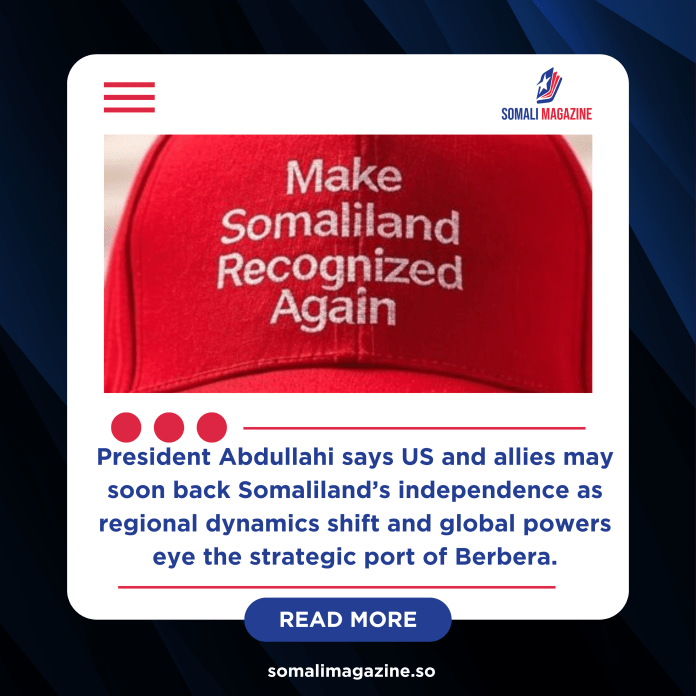Facebook Twitter (X) Instagram Somali Magazine - People's Magazine
President Abdullahi says US and allies may soon back Somaliland’s independence as regional dynamics shift and global powers eye the strategic port of Berbera
Somaliland’s new president, Abdirahman Mohamed Abdullahi, says the breakaway state is closer than ever to being officially recognised as an independent country. In an interview from the presidential palace in Hargeisa, he told The Guardian that international recognition is now “likely,” after more than three decades of waiting since Somaliland declared independence from Somalia in 1991.
“Recognition is on the horizon,” said the 69-year-old leader, who was sworn into office five months ago.
Despite its peaceful elections and relative stability, no country has yet formally recognised Somaliland. Somalia still considers it part of its territory, and any move to recognise it would anger Mogadishu and raise tensions in the Horn of Africa. Some fear it could also inspire other secessionist movements across Africa.
However, Abdullahi believes it is only a matter of time. “It’s not about if, but when – and who will be the first to recognise us,” he said.
One strong possibility is the United States. Reports suggest that officials close to former U.S. President Donald Trump are considering recognition in exchange for permission to build a military base in Berbera, a key port on the Gulf of Aden. The U.S. already has a major base in nearby Djibouti, but concerns are growing over China’s rising influence there.
Trump’s policy blueprint for a second term, known as “Project 2025,” reportedly includes recognising Somaliland as a way to secure U.S. interests in the region.
President Abdullahi confirmed that senior U.S. military officials have recently visited Somaliland, and another delegation is expected soon to assess the Berbera site. He said Somaliland is a key partner in counter-terrorism, regional security, and protecting international trade routes through the Red Sea.
“The U.S. sees us as a reliable partner. We have met the U.S. ambassador to Somalia three times since I took office,” he added.
The U.S. has not yet made any official announcement, and the State Department still supports Somalia’s territorial integrity. However, some members of Trump’s team are reportedly pushing to abandon the long-standing “One Somalia” policy, especially as the Somali government struggles to contain the al-Shabaab insurgency.
Gavin Williamson, former UK defence secretary and a supporter of Somaliland’s independence, said he believes recognition is coming soon. “I think it will happen by 2028, possibly even within a year,” he said, pointing to conversations with U.S. officials.
The United Arab Emirates also has a growing interest in Somaliland. It has invested more than $442 million in Berbera’s port and a highway connecting it to Ethiopia – a landlocked country eager for sea access. Ethiopia’s deal with Somaliland last year included potential recognition in return for port rights, which sparked outrage from Somalia and raised fears of regional conflict.
Another possible factor in future recognition is Somaliland’s role as a destination for refugees. The country has quietly welcomed thousands of people fleeing conflict, including from Syria, Sudan, and Palestine. Currently, around 23,000 refugees live in Somaliland, including 2,000 Syrians and 300 Sudanese families.
Deputy refugee director Aidrous Osman Hussain said Palestinians have been coming since the early 2000s. “Somaliland is open to all refugees. We are Muslims, and we understand suffering,” he said.
Although there have been rumours about Somaliland being considered for the resettlement of displaced Palestinians from Gaza, Abdullahi dismissed any formal plans. “There are no discussions with any country about this. But if Palestinians come by choice, we welcome them.”
He added that recognition would help Somaliland gain access to international aid and better support the growing number of refugees.
“Recognition will allow us to do more,” said Hussain. “We can share the global burden of helping those in need.”

